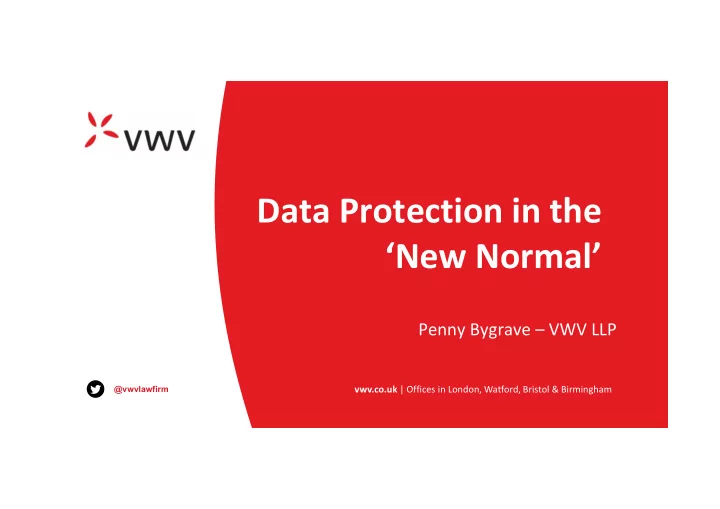

Data Protection in the ‘New Normal’ Penny Bygrave – VWV LLP @vwvlawfirm vwv.co.uk | Offices in London, Watford, Bristol & Birmingham
What We Will Cover • Working From Home • Cyber Security • Implementing Test, Track & Trace (for Staff and Customers) • Latest Government Guidance • Q&A
Cyber Security & Home Working @vwvlawfirm vwv.co.uk | Offices in London, Watford, Bristol & Birmingham
Your Legal Obligations • General Data Protection Regulation (GDPR) • Must adopt appropriate measures to keep personal data secure • What is personal data? • Any information relating to an identified (or identifiable) living person • Organisational measures (e.g. policies and training) • Technical measures (e.g. firewalls, anti-virus software)
How to Protect Personal Data • Strong passwords • Backup your data • Anti-virus software • Firewalls • Patching – updating software and devices • Two factor authentication • Staff training • Guidance for staff
Scams and Phishing • Cyber criminals are exploiting the coronavirus situation • Increase in the number of scams since the start of the outbreak
Be Vigilant • How to spot scam emails and texts (phishing). These are some signs: • Urgency and emotion – demands quick response, plays on your emotions • English not perfect • Sender’s email address looks slightly strange • Not addressed personally to you e.g. Dear Customers • Asks you to do something e.g. click on a link, open an attachment, provide login details • However they are becoming increasingly sophisticated and more difficult to spot.
Personal Data Breaches What is a personal data breach under the GDPR? • A security incident that has affected the confidentiality, integrity or availability of personal data • Cyber attacks can lead to a personal data breach e.g. if the hacker gains access to your client database • However, often human error e.g. email sent to wrong person, papers left on a train.
Training • Training for all staff • Induction and ongoing training • Online or in person? • Specific training for staff with particular roles e.g. senior management, marketing, trustees
Practical Tips • Develop a culture of data protection • Be vigilant around information security • Prepare for data breaches • Provide appropriate training • Have the correct documentation in place
TTT: Test, Track and Trace • Testing people for coronavirus • Tracking the spread of the virus; and • Tracing the people an infected person has come into contact with
Track and Trace You must carry out a Data Protection Impact Assessment (DPIA) for any contact tracing solutions prior to implementation.
Track and Trace 1. Only collect what you need (name, contact details and date and time of their visit) 2. Only use it for the purpose it is collected (i.e. for track and trace) and do not share it with anyone other than NHS track and trace. 3. Don't keep the data longer than necessary (21 days). 4. Make sure you have appropriate technical and organisation measures to keep the data secure and confidential. 5. Most importantly: be transparent : tell people what you are doing, why, and what their rights are by providing them with a privacy notice.
Brexit Certain documentation will need to be updated when we leave. However, what changes need to be made depend on the deal made. We anticipate that changes may be required to: • Privacy notices • Article 30 record • Contracts
Any Questions?
Penny Bygrave Senior Associate pbygrave@vwv.co.uk 07909 681 572 @vwvlawfirm vwv.co.uk | Offices in London, Watford, Bristol & Birmingham Lawyers & Parliamentary Agents
Recommend
More recommend